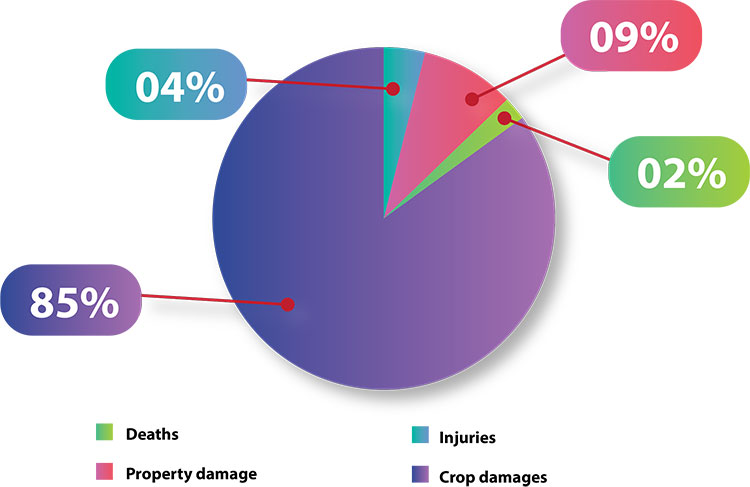Business
Bridging conservation and livelihoods: Addressing the Human-Elephant Conflict in Sri Lanka on World Elephant Day

By Ruwan Samaraweera
Written ahead of World Elephant Day, observed on 12 August 2023.
On World Elephant Day, attention turns to the unique challenges faced by Sri Lanka in the realm of human-elephant conflict (HEC). HEC’s escalating toll paints a stark reality. Human communities endure property damage, crop loss, and tragic fatalities, amplifying poverty and socio-economic instability. In 2022, as per the Department of Wildlife Conservation (DWC), Sri Lanka documented a total of 145 human fatalities resulting from HEC. Simultaneously, elephants face habitat loss, injuries, and mortality due to retaliatory killings and encounters with human settlements. DWC reported a substantial rise in elephant mortality, reaching a peak with a recorded total of 433 deaths in 2022. Therefore, the urgent need for implementing effective solutions to minimise HEC in the country becomes paramount.
Understanding the Conflict
 The HEC is one of the widespread environmental issues with severe socio-economic and political implications in Sri Lanka. It arises from numerous reasons, wherein the competition for resources and land between humans and elephants being the most prominent. Rapid urbanisation, encroachment into elephant habitats, conversion of forests for agriculture, and other infrastructure development projects like road infrastructure have disrupted the elephants’ traditional migration patterns and fragmented their habitats. Consequently, elephants often venture into human settlements in search of sustenance, leading to conflicts that endanger both elephants’ and human lives.
The HEC is one of the widespread environmental issues with severe socio-economic and political implications in Sri Lanka. It arises from numerous reasons, wherein the competition for resources and land between humans and elephants being the most prominent. Rapid urbanisation, encroachment into elephant habitats, conversion of forests for agriculture, and other infrastructure development projects like road infrastructure have disrupted the elephants’ traditional migration patterns and fragmented their habitats. Consequently, elephants often venture into human settlements in search of sustenance, leading to conflicts that endanger both elephants’ and human lives.
Sumanadasa, a farmer in Galgamuwa, shares his experience of frequent elephant raids on their crop lands. He says, “As a farmer, my family depends on the crops we cultivate for our livelihood. However, the constant raids by elephants have taken a toll on our lives. We wake up each morning with anxiety, not knowing if our fields will be destroyed overnight. Our hard work and investment go in vain as elephants trample and devour our crops. It has become a struggle to provide for our family and maintain a sustainable income.”
These heart-wrenching stories highlight the profound impact of the HEC on individuals and communities. Beyond the economic losses, the emotional trauma and loss of human lives are immeasurable. The alarming increase in human and elephant fatalities resulting from HEC in Sri Lanka underscores the gravity of the situation. The average annual human death rate due to HEC increased by approximately 42% from 1992 to 2021, with the 2021 figure reaching 142 deaths. Despite fluctuations, the number of HEC-caused human deaths has consistently exceeded 100 per year over the last three years, resulting in a total of 2,111 human and 5,954 elephant casualties within the last 30 years. Apart from that, as already mentioned, crop damages emerge as a pervasive and severe issue. An IPS study revealed that among the crops grown in HEC-prone areas, paddy is the most vulnerable crop for elephant attacks, following coconut and banana. Furthermore, farmers have altered their cropping seasons due to this wild elephant risk.
Recognising the urgency of addressing the HEC, Sri Lanka has undertaken various policy initiatives and conservation efforts. Some of these are institutionally arranged measures while some are voluntary adjustments by affected communities. The DWC plays a crucial role in mitigating conflicts, implementing institutionally arranged measures such as creating elephant corridors, elephant drives, thunder flashes distribution, habitat enrichments and installing electric fences to reduce human-elephant interactions. Additionally, community-based conservation projects involving local communities in decision-making have shown promising results in promoting peaceful coexistence in some parts of the country. As a multifaceted approach to mitigating HEC, DWC has been implementing the “GajaMituro‟ programme since 2008. Under this, the DWC launched the aforementioned mitigating measures in 58 Divisional Secretariat Divisions (DSD) of 18 Districts. Similarly, residents in affected areas practice numerous voluntary measures to deter problems from elephants. Some examples of voluntary measures include erecting watch huts, creating noise (e.g., firing thunder flashes, shouting), establishing biological fences, and using lighting methods such as fires, kerosene lamps, flares, and flashlights to frighten and chase away the elephants. However, none of the mitigation measures has given a perfect solution due to various limitations. For instance, some elephants develop adaptive behaviours to actions such that thunder flashes, thus making those no longer effective against them.
Hence, to effectively manage the HEC, innovative solutions are imperative, and the government, academia, and other interested stakeholders continue to actively pursue innovative approaches and optimal strategies to effectively tackle the issue of HEC in Sri Lanka. Technology-driven approaches, including using infrared cameras, drones, sensor-based systems, and satellite imagery to detect habitat monitoring and elephant movements and then using mobile communication systems to alert nearby communities in real-time (early warning system), can help prevent conflicts. Through educational programmes in schools and community outreach initiatives, a sense of responsibility can be instilled while highlighting innovative market-based solutions like insurance. An IPS study found that insurance as a market-based solution can deliver promising results. These solutions can be complemented by agro-ecological practices such as cultivating elephant-resistant crops, bee-fencing and establishing community-managed buffer zones around protected areas.
Conclusion
As World Elephant Day serves as a powerful global platform for raising awareness on elephant conservation, Sri Lanka can capitalise on this occasion to promote understanding, empathy, and conservation values within local communities.
It is crucial to acknowledge that no single solution can entirely address the complexities of the HEC issue, given its regional variations, changes in elephant behaviour, and diverse human activities. Therefore, adopting a holistic approach that combines suitable traditional methods alongside innovative strategies, involving local communities, and considering the conflict’s ecological, economic, and social aspects becomes essential for effective and sustainable HEC mitigation. Collaboration among government agencies, conservation organisations, and local communities becomes paramount in achieving a harmonious coexistence where elephants roam freely, and humans thrive.
By adopting this comprehensive approach, Sri Lanka can strive towards a future where both elephants and humans coexist peacefully, safeguarding the well-being of these majestic creatures for generations to come. World Elephant Day serves as a poignant reminder that collective action and shared responsibility are crucial in preserving the rich biodiversity and cultural heritage that define this island nation.
Link to blog: https://www.ips.lk/talkingeconomics/2023/08/10/bridging-conservation-and-livelihoods-addressing-the-human-elephant-conflict-in-sri-lanka-on-world-elephant-day/
Ruwan Samaraweera is a Research Officer at IPS with a background in entrepreneurial agriculture. He holds a Bachelor’s in Export Agriculture from Uva Wellassa University of Sri Lanka. His research interests are environmental economics, agricultural economics, macroeconomic policy and planning, labour and migration, and poverty and development policy. (Talk to Ruwan – ruwan@ips.lk)
Business
AHK Sri Lanka champions first-ever Sri Lankan delegation at Drupa 2024

The Delegation of German Industry and Commerce in Sri Lanka (AHK Sri Lanka) proudly facilitated the first-ever Sri Lankan delegation’s participation at Drupa 2024, the world’s largest trade fair for the printing industry and technology. Held after an eight-year hiatus, Drupa 2024 was a landmark event, marking significant advancements and opportunities in the global printing industry.
AHK Sri Lanka played a pivotal role in organising and supporting the delegation, which comprised 17 members from the Sri Lanka Association for Printers (SLAP), representing eight companies from the commercial, newspaper, stationery printing, and packaging industries. This pioneering effort by AHK Sri Lanka not only showcased the diverse capabilities of Sri Lanka’s printing sector but also facilitated vital bilateral discussions with key stakeholders from the German printing industry.
Business
Unveiling Ayugiri: Browns Hotels & Resorts sets the stage for a new era in luxury Ayurveda Wellness

In a captivating reimagining of luxury wellness tourism, Browns Hotels & Resorts proudly unveiled the exquisite Ayugiri Ayurveda Wellness Resort Sigiriya. This momentous occasion, celebrated amidst a vibrant and serene grand opening on the 6th of June, heralds a new chapter in the Ayurveda wellness tourism landscape in Sri Lanka. Nestled amidst 54 acres of unspoiled natural splendour, Ayugiri features 22 exclusive suites and stands out as the only luxury Ayurveda wellness resort in the country offering plunge pools in every room, rendering it truly one-of-a-kind.
The grand opening of Ayugiri Ayurveda Wellness Resort was an enchanting event, where guests were captivated by the melodies of flutists and violinists resonating through Sigiriya’s lush landscapes. As traditional drummers and dancers infused the air with vibrant energy, Browns Hotels & Resorts’ CEO, Eksath Wijeratne, Kotaro Katsuki, Acting Ambassador for the Embassy of Japan and General Manager, Buwaneka Bandara, unveiled the resort’s new logo, marking a significant moment witnessed by distinguished guests from the French Embassy, Ayurveda and wellness enthusiasts along with officials from the Sigiriya area, LOLC Holdings and Browns Group.
“Our strategic expansion into wellness tourism with Ayugiri Ayurveda Wellness Resort Sigiriya symbolises a significant milestone for Browns Hotels & Resorts. Wellness tourism has consistently outperformed the overall tourism industry for over a decade, reflecting a growing global interest in travel that goes beyond leisure to offer rejuvenation and holistic well-being. By integrating the timeless wisdom of Ayurveda with modern luxury, we aim to set a new standard in luxury wellness tourism in Sri Lanka. Whether your goal is prevention, healing, or a deeper connection to inner harmony, Ayugiri offers a sanctuary for holistic well-being” stated Eksath Wijeratne.
Ayugiri encapsulates the essence of life, inspired by the lotus flower held by the graceful queens of the infamous Sigiriya frescoes. Just as the lotus emerges from the murky depths, untainted and serene,
Ayugiri invites guests on a journey of purity and rejuvenation, harmonised with a balance of mind, body and spirit, the essence of nature, echoes of culture and the wisdom of ancient Ayurvedic healing.
Business
HNB General Insurance recognized as Best General Bancassurance Provider in Sri Lanka 2024

HNB General Insurance, one of Sri Lanka’s leading general insurance providers, has been honored as the Best General Bancassurance Provider in Sri Lanka 2024 by the prestigious Global Banking and Finance Review – UK.
The esteemed accolade underscores HNB General Insurance’s unwavering commitment to excellence and its outstanding performance in the field of bancassurance. Through dedication and hard work, the HNB General Insurance team has continuously endeavored to deliver innovative insurance solutions, cultivate strong relationships with banking partners, and provide unparalleled service to customers nationwide. This recognition is a testament to the team’s dedication and relentless pursuit of excellence in the bancassurance business.
“We are honored to receive this prestigious award, which reflects our team’s tireless efforts and dedication to delivering value-added insurance solutions and exceptional service through our bancassurance partnerships,” said Sithumina Jayasundara, CEO of HNB General Insurance. “This recognition reaffirms our position as a trusted insurance provider in Sri Lanka and motivates us to continue striving for excellence in serving our customers and communities.”












